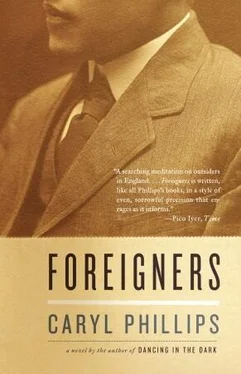However, the biggest cloud hanging over Turpin's head, and one that was potentially far more damaging than his mother's disapproval of who he had married, was the ongoing situation with Adele Daniels. The case was not only proving to be prohibitively expensive in terms of legal fees, but there was also his reputation to defend and the fact that until this dispute was resolved he was effectively banned from fighting in the United States. Adele Daniels' civil case against Turpin reached the courts in late 1954, and the serious allegation of rape was added to the assault charges. Turpin's American lawyer led the fighter to understand that should Turpin lose the case then the settlement was likely to be a payment in excess of $100,000, and this would effectively ruin Turpin for life. Eventually, in November 1955, a somewhat worried Randolph Turpin returned to New York City and began to tell a slightly different tale. He conceded that, back in 1951, if it were not for the fact that he was still married to Mary Stack, then he would have married Adele Daniels at the time of the Sugar Ray Robinson rematch. He admitted the existence of a substantial number of love letters between them, which included proposals of marriage on his part, but he was adamant that on returning to New York for the Olsen fight he had made it very clear to Adele Daniels that marriage was no longer a possibility. Miss Daniels did not dispute Turpin's claim that he said he no longer wished to marry her, but she insisted that one moment he said that this is what he desired, and the next he would retract his statement. Clearly his deep ambivalence about marrying her had served only to inflame her anger. Miss Daniels' attorney, Mr J. Roland Sala, asserted that Turpin was clearly unstable, angry, and out of control. He characterised the defendant as 'a jungle beast in human form, and a dangerous killer' and said that Miss Daniels had wondered if his condition had been made worse by the beating that he had taken. Miss Daniels repeated, and stood by, her claim that she had suffered blows from Turpin's fists and boots that had left her psychologically scarred.
On the fourth, and last, day of the trial, the case was eventually settled after a long discussion between the two sets of lawyers. Turpin insisted that he had paid Miss Daniels money for food and rent, and he furiously denied ever raping or assaulting her. Miss Daniels was adamant that he had not only done so, but he had said that she was like all Americans, 'trying to push me around'. She insisted that Turpin had continued and told her in no uncertain terms that, 'I am the master, and in England when I say move they move.' According to Miss Daniels he once assaulted her and then said, 'If you make one step to call the police I'll break your neck and if I don't others will.' When she pressed him as to what exactly he meant, he pointed to his connections in the boxing world. The lawyers listened to their clients' claims and counterclaims, and sensing that these unsupported allegations could go on being made and denied for a long period of time, the potential six-figure settlement was reduced to $3,500 which a frustrated Turpin quickly agreed to pay, thus accepting culpability for some wrongdoings. Miss Daniels had decided to settle for this lesser amount against her lawyer's advice, but like Turpin she too was tiring of these proceedings. Turpin's lawyer quickly attempted to seize the moral high ground, and he issued a statement suggesting vindication for his client. However, a relieved Turpin was by now totally indifferent to any more legal posturing, and he was simply happy to be able to finally put the United States, and the memory of Miss Adele Daniels, behind him.
But what did he have to return to in England? The truth was, in 1955 Turpin was facing serious problems both in the ring and out of it. Two years earlier, after he had returned from the Olsen debacle, George Middleton had encouraged his fighter to undergo a full medical check-up. The doctors soon discovered that not only did Turpin have an enlarged liver, his hearing had grown worse, and his eyesight was deteriorating. In fact, during the voyage to New York for the Carl 'Bobo' Olsen fight, his brother Jackie had noticed that while they were doing their roadwork running around the upper deck of the Queen Mary , Turpin had a tendency to drift a little and sometimes even run into him. A medical examination soon determined that Turpin could see straight ahead, but his peripheral vision was restricted, which could have serious consequences for a fighter as he would not be able to see some punches coming. On 2 January, 1954, Turpin was fined two pounds at Abergate Magistrates' Court for being in possession of a rifle without a firearms licence, and the gun was confiscated. It was extensively reported in the press that during the court proceedings the fighter's hearing appeared to be impaired, for Turpin was often struggling to hear what was being said in the courtroom, but the British Boxing Board of Control, who could easily have withdrawn his boxing licence, chose to do nothing. In late January 1954, Turpin was charged and convicted of dangerous and careless driving and fined fifteen guineas, but his driving licence was not confiscated and he continued to drive recklessly. In fact, during the two years between his return from the loss to Olsen, and the Adele Daniels trial in New York, Turpin experienced great difficulty holding his life in order. His worries over his deteriorating relationship with his family, the impending court case in the United States, and his increasingly desperate financial situation, continued to trouble him. But what concerned others was not only what they considered to be his increasingly erratic behaviour, but his declining abilities in the ring.
After the loss to Olsen, Turpin began to lose to men who he should have comfortably beaten. In May 1954 Turpin suffered a first-round knockout in Rome and lost his European middleweight title to a light-puncher named Tiberio Mitri. This was a bout he should have won with ease, and this shocking loss marked the end of any further world title aspirations. Turpin's heart seemed to have gone out of fighting, and on those few occasions when he did muster the energy and focus to take a fight seriously, the press observed that this was clearly not the same fighter who, only a few years earlier, had fought so gallantly against the great Sugar Ray Robinson. His brother Jackie, who during this bleak period continued to spar with Randy, noticed that one moment his brother could be jovial and ready to joke around, and the next moment he could become extremely angry. These sudden and unexpected mood swings were now often accompanied by blinding headaches, but Turpin refused to seek any medical help. The defeats became embarrassing, particularly a fourthround knockout loss to a 'nobody' named Gordon Wallace in October 1954, a man who managed to floor Turpin four times and embarrass him so badly that Turpin temporarily retired. However, although Turpin's box office status began now to rapidly decline, he needed to fight to make money. In November 1956, Turpin did manage to defeat Alex Buxton and retain his British light-heavyweight title, and he was eventually able to claim a Lonsdale belt outright when he defended his light-heavyweight title for a third time in June 1957, winning a turgid fifteen-round decision over the little known Arthur Howard. But even this no-hoper managed to knock Turpin to the canvas three times during the course of the fight. There was little further glory in 1957, or during the first half of 1958. The halfdozen victories that he was able to accumulate were all achieved against woefully inadequate opposition, yet the cost of these 'triumphs' involved Turpin taking a great deal of physical punishment. The end came in Birmingham on 9 September, 1958, when Turpin was pummelled by a Trinidadian named Yolande Pompey who easily knocked him out in two rounds. The correspondent for the London Evening Standard summed things up. 'No doubts now — Turpin is just another fighter. . the whiplash punch and the split-second timing that once gave him world supremacy have gone. And Turpin must not blame us for noting their passing — with infinite regret.'
Читать дальше











![Unknown - [Carly Phillips] The Bachelor (The Chandler Brothe(Bookos.org) (1)](/books/174132/unknown-carly-phillips-the-bachelor-the-chandle-thumb.webp)
